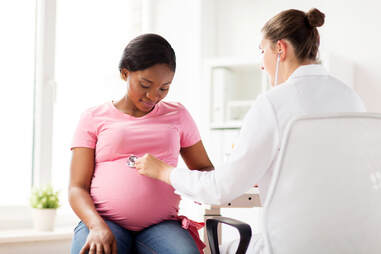 Women’s OBGYN: does it hurt to have a mammogram? Women’s OBGYN can help you whether you have a regular mammogram screening every year or if you are preparing for your first time, however, no matter how experienced you are, all women at one time or another have wondered, is this going to hurt? There is some discomfort involved during the imaging process. However, the pain can usually pass quickly if you take steps to reduce it. Mammograms can be a tool that can save lives which will take a detailed x-ray image of your breasts. Early-stage breast cancer can be revealed during a mammogram, this can increase your chance of beating the disease significantly. So, you can probably agree that finding the early stages of breast cancer can be worth the brief moments of discomfort that may be experienced during this procedure. Will it hurt? Whether or not a mammogram will hurt depends on a number of factors, including:
Some issues can occur if the position of the machine is not correct. For example, some patients may have to contort their backs because of the height of the mammogram machine. This can result in neck or back pain from straining the muscles. Letting the technician know if the position of the machine feels uncomfortable will be important since this will mean that it is at the wrong height. Are there any side effects? There shouldn’t be any long-term or alarming side effects to the tissues in your breasts from a mammogram. Just like any other x-ray exam, a mammogram will expose you to a small amount of radiation. This has caused an ongoing debate as to how often a woman should have a mammogram performed. The amount of radiation that you will be exposed to is minimal, the benefits of having a test done for breast cancer as early as possible can outweigh the side effects or risks of the radiation exposure. What if there is some pain afterward? You can speak with your doctor about the use of Motrin or Tylenol if you are experiencing any pain or discomfort after your examination. Even though there may be some discomfort that will be associated with your mammogram, most women are able to tolerate the process well. Women’s OBGYN in Atlanta and Alpharetta GA Women’s OBGYN can help you to understand how to prepare for this simple and non-invasive exam. Detecting and treating breast cancer within its early stages can mean that there is an excellent chance of treatment and survival. A mammogram is a useful tool for detecting and treating breast cancer even though it can be uncomfortable for a short period of time. Contact your top Alpharetta and Atlanta OBGYN for your obstetrics and gynecology care.
0 Comments
 Women’s health experts want you to know the importance of nutrition during your pregnancy Our women’s health experts will tell you that it is always important to have a balanced diet, this is even more important during your pregnancy due to the fact that what you will eat is the main source of nutrients for the baby. With that being said, many women still don’t get enough folate, iron, vitamin D, calcium, or protein. It will be important for you to increase the foods you eat with these nutrients during your pregnancy. A healthy diet that contains plenty of vegetables, fruits, proteins, and whole grains can meet the increased needs of most women. You should always try to eat a variety of foods from these food groups. When you do, there is most likely to be enough nutrients that your baby will need to have a healthy pregnancy. Nutrition during pregnancy There is a link to healthy birth weight and good brain development from having a nutritious diet during your pregnancy, many birth defects can also be reduced. Anemia can be reduced thanks to a well-balanced diet, as well as other pregnancy symptoms that can occur such as morning sickness and fatigue. When to start with a nutrition plan You can begin your nutrition plan before you are pregnant. As a matter of fact, both women and men can increase fertility with the appropriate nutrition plan. You should consider starting a nutrition plan and regular exercise in order to increase the chances of you getting pregnant if you are finding it difficult. This can help to ensure that you start to form a healthy habit that will continue throughout the stages of pregnancy as well as improve your fertility. These healthy habits will be a big benefit to you throughout the rest of your life, which, in turn, will also help your child to have optimal health. Is gaining weight, ok? Eating a variety of foods from each food group every day is a simple way to satisfy your needs for good nutrition during your pregnancy. It is completely expected and natural to gain weight while pregnant. Before getting pregnant, if your weight is within a normal range, it is recommended that you experience a weight gain of approximately 25 to 35 pounds. Throughout your pregnancy, it is important to monitor your weight and discuss your nutritional needs with a doctor. People who are underweight before conceiving, or who have obesity, and for those who are having a multiple gestation pregnancy, such as having twins, will have varied recommendations about weight gain. Women’s health in Atlanta and Alpharetta GA Women’s health is absolutely necessary during pregnancy and good nutrition is an important part of the process, however, it can also help during all stages of life. To be sure that you are experiencing optimal health during your pregnancy, an effective plan for nutrition and exercise should be put into place. Contact your top Alpharetta and Atlanta OBGYN for your obstetrics and gynecology care.  Women’s specialist: postpartum bleeding and how to manage it A women’s specialist will explain to you that after giving birth, whether you have a Cesarean section or a vaginal delivery, you will have discharge and vaginal bleeding. This is also known as lochia. This is how your body gets rid of the extra tissue and blood in your uterus that helped to grow your baby. The first few days after the baby is born, bleeding will be its heaviest. But you may need to speak with your doctor if the heavy bleeding continues. However, you can rest assured that postpartum bleeding is temporary and normal. Why you are bleeding The blood that you see after giving birth to your baby is called lochia. It will typically last for four to six weeks after delivery and is a type of discharge that is similar to your period. It contains:
The bleeding is caused by your uterine lining when it sheds and restores itself, like during your period. The lochia will mostly be blood at first. You will most likely see more mucus than blood as the days and weeks go by. What to do if you’re bleeding The bleeding may be so heavy at first that you will need to wear a hospital pad. When you are discharged a nurse may give you some of these absorbent pads. You can start to transition to your regular menstruation pad as the bleeding slows. To prevent infection, be sure to change your pads often. Until your doctor says that it is fine to do so, don't use any tampons. You can then switch to a panty liner when the bleeding is light enough, or you are only seeing a discharge. Other postpartum bleeding tips: When possible, take it easy The process of the lochia lightening up can be slowed by overexertion. Pee as often as possible Even when your bladder doesn’t feel completely full, go to the bathroom as often as possible. Emptying your bladder will help your uterus to contract and release everything that it needs to. Use your Peri bottle You can keep your sensitive areas clean by rinsing with this, especially if you gave birth vaginally. When to look for emergency help Up to 12 weeks after giving birth, approximately 5% of women can experience something called postpartum hemorrhage. Here are the signs to keep an eye out for, seek medical attention right away if you're experiencing any of the following:
Women’s specialist in Atlanta and Alpharetta GA Your women’s specialist will be able to help you when you need medical help after noticing any abnormal signs that we have mentioned. You can save yourself from stress while also taking care of your health with timely caution and attention. It is also essential to take care of your own health while also focusing your care and attention on the new baby. Contact your top Alpharetta and Atlanta OBGYN for your obstetrics and gynecology care.  Women’s health specialist shares how to manage menopause Top women’s health experts can help you to deal with the bodily changes that will occur during this stage in your life, every person’s experience with menopause will be different and it may feel both isolating and frustrating. This is the reason why self-care during this time is important. The terms perimenopause and menopause are used interchangeably, however, they both describe changes that are experienced just before or after the last period. Menopause is described as the last menstrual period, and it is confirmed when you haven’t had a period for 12 months consecutively. What will happen during menopause? Early on during their transition, women will often begin to have symptoms that can become disruptive such as mood disturbance and sleeplessness even while periods are still happening during a regular cycle. The higher levels of estrogen that accompany early perimenopause can mean that you will experience heavy bleeding, tender, swollen breasts, and increased premenstrual symptoms. As you approach your late 30’s, your ovaries will begin to produce less estrogen and progesterone, these are the hormones that regulate your menstruation, and your fertility will start to decline. By the age of 40, you will begin noticing your periods start becoming more erratic and less frequent. On average, by your early 50’s, your ovaries will eventually stop releasing eggs and your periods will stop completely. Should you see your doctor? It is important for you to know if you're experiencing light or mild symptoms, that the symptoms of menopause might start to disappear on their own. However, you should see your doctor if your symptoms are beginning to interfere with the quality of your life and interrupt your regular daily activities. The symptoms of menopause are common, however, your quality of life does not have to suffer because of it. To help manage your symptoms, your doctor may prescribe specific treatments. They may also provide you with some extra counseling or guidance in other aspects of your health that can possibly be affected by your menopause. Managing your menopause Your options for managing your menopause will be customized to your own needs and your medical history. One or more of the following may be prescribed by your doctor:
Women’s specialist in Atlanta and Alpharetta GA: outlook for menopause Going through the menopause, as with other major life changes, can leave you feeling slightly unbalanced and unsure of what is going to happen next. The symptoms that are experienced with menopause can last from a few months to years after your last period and can be unpredictable. Your doctor is there to help you no matter wherever you are in the process. Contact your top Alpharetta and Atlanta OBGYN for your obstetrics and gynecology care.  Women’s specialist talks about ovarian cysts Our women’s specialist understands that the word “cyst” can make people a little nervous, but there has been a growth in awareness surrounding ovarian cysts over the years. It is important to learn as much as you can about this benign and relatively common condition if you are concerned that you or a loved one may have an ovarian cyst. What is an ovarian cyst? An ovarian cyst is a fluid-filled or solid pocket on or in your ovary. They are common, more so in women who have not gone through menopause or are pregnant. They can be harmless and painless most of the time. You may even have one every month as a part of your monthly menstrual cycle and never know you had one. Usually, they will go away without the need for treatment on their own. When a cyst gets bigger or doesn’t go away is when it becomes a problem. It can start to be painful. Although rare, they can also be cancerous. As you get older, the chances go up. There are several different types of cysts, most don’t require treatment and are noncancerous:
Symptoms of ovarian cysts Most of the time, a cyst will be small and won’t cause any problems. If there are any symptoms, you might feel bloating, pressure, pain, or swelling in one side of your belly. This pain can come and go as well as either be dull or sharp. A cyst will sometimes need emergency attention. You should see your doctor right away if you have:
These are signs that your cyst may have caused your ovary to twist. How an ovarian cyst is treated Without you even knowing it was there, most of the time the cyst will disappear without the need for any treatment. However, you will have two options, should you have a cyst that needs treatment, either watchful waiting or surgery. When a cyst is very large, is causing other symptoms, or it might be cancerous, a doctor will then recommend surgery. Your doctor, if this is the case, might perform surgery to remove the cyst from the ovary, or remove the ovary itself from your body. Most likely, your doctor will carefully monitor a cyst with repetitive ultrasound exams. The ultrasounds will determine whether the size of the cyst or appearance has changed during the exams. Most cysts will resolve themselves without any surgical intervention needed, although it may take time. Women’s specialist in Atlanta and Alpharetta GA A women’s specialist will quickly evaluate and diagnose an ovarian cyst. Depending on the type of cyst, the treatment will be different. Contact your top Alpharetta and Atlanta OBGYN for your obstetrics and gynecology care.  Prenatal care gynecologist: what are the signs of pregnancy? Prenatal care gynecology ultrasounds and pregnancy tests are the only ways to be sure that you are pregnant, you can also look out for symptoms and signs. A missed period is the earliest sign of pregnancy. Other signs may include a sensitivity to smells, morning sickness, and fatigue. Do all women experience early pregnancy symptoms? Every woman’s experiences of pregnancy are different. Not every woman will have the same symptoms from one another, you may not even have the same symptoms from one pregnancy to the next. However, you may not even realize you are pregnant because the early symptoms often are the same that you may experience right before and during menstruation. What are the early signs of pregnancy? Here we have listed some of the most common early symptoms of pregnancy. Keep in mind that these symptoms can be caused by other issues besides being pregnant. So, noticing some of these symptoms doesn’t mean you are necessarily pregnant. A pregnancy test will be the only sure way to tell. Cramping and spotting: A fertilized egg will attach itself to your uterus wall after conception. This may cause spotting and, sometimes, cramping, these are some of the earliest signs of pregnancy. This can happen anywhere from 6 to 12 days after egg fertilization. Breast changes: Another early sign of pregnancy are breast changes. During conception, your hormone levels will change rapidly. Your breasts may become sore, swollen, or tingly a week or two later because of the changes. They may even feel fuller, heavier, or feel tender to the touch. Your areola may also darken. Fatigue: Feeling very tired early on is normal during pregnancy. You may start feeling unusually tired as early as one week after conception. This is due to a high level of the hormone progesterone, however, other things such as low blood sugar, low blood pressure, and raise blood production can also cause fatigue. Nausea or morning sickness: This is a very famous symptom of pregnancy. However, not every woman will experience it when pregnant. Pregnancy hormones are likely the cause of this symptom although the exact cause isn’t known. Missed period: This is the most obvious pregnancy symptom, this is the one that will prompt most women to have a pregnancy test. However, not all delayed or missed periods are caused by pregnancy. You can also experience some bleeding when pregnant, you should ask your doctor what you need to be aware of with bleeding when you’re pregnant. Prenatal care gynecology in Atlanta and Alpharetta GA Prenatal care gynecology experts will explain to you that many of the pregnancy symptoms and body changes that you experience will begin to dissipate when you reach the second trimester. If you have any symptoms that interfere with your day-to-day life you should speak to your doctor. Contact your top Alpharetta and Atlanta OBGYN for your obstetrics and gynecology care.  Top women’s specialist: are fibroids dangerous? A women’s specialist will explain to their patients that a fibroid is an abnormal growth that can develop on or in the uterus. Patients can experience heavy periods and severe abdominal pain due to these tumors. Also, no symptoms or signs can be seen at all. Typically, these growths can be noncancerous or benign. However, the cause of a fibroid is unknown. Fibroids can form in many different sizes, from seedlings that are undetectable to the human eye, to big masses that can distort and increase the size of your uterus. There can either be a single fibroid or multiple fibroids. In some cases, multiple fibroids can enlarge the uterus to the point that they will reach the rib cage and add weight. During their lives, many women will experience fibroids. But because they often don’t cause any symptoms, you may not know you have one. Your doctor may accidentally find a fibroid during a prenatal ultrasound or a pelvic exam. How are they diagnosed? Usually, an ultrasound is used to diagnose any fibroids. Fibroids are usually easily seen with ultrasound and are the easiest way to see your uterus. Your doctor may perform an exam where he or she can feel if your uterus is larger than normal and will most likely suspect fibroids. The only way to diagnose a smaller fibroid is often with an ultrasound. To see exactly where the fibroids are located, your doctor may choose to have an MRI of your pelvis. Can a fibroid affect fertility? Many pregnant patients can have fibroids and unless they are interfering with your uterus lining, they should not have any negative effects on your fertility. However, if you are not able to get pregnant and you also have fibroids, having your doctor remove the fibroid can increase your chances of pregnancy. If you have fibroids during your pregnancy, they might prevent your baby from moving into the proper position with the head facing down. In these instances, your baby is most likely to be breached because of the restriction of the baby's movements to get into position because of the fibroid. How are fibroids treated? Usually, you will not need any treatment if you are not experiencing any symptoms while having fibroids. If you are experiencing symptoms, the severity of the symptoms and your condition will determine the recommended treatment. Noninvasive treatments may be of benefit to you when fibroids are interfering with the quality of your life. You can have relief from minor discomfort from acetaminophen or nonsteroidal anti-inflammatory drugs, or NSAIDs. Women’s specialist in Atlanta and Alpharetta GA Top women’s specialists in Atlanta and Alpharetta GA can remove as much of the fibroid that they can see, but this also means that a smaller one can be left behind. This will mean that it will have a larger supply of blood and may increase in size because of it. Contact your top Alpharetta and Atlanta OBGYN for your obstetrics and gynecology care. |
AuthorThe best women’s specialists in Atlanta and Alpharetta. Archives
November 2021
Categories
All
|
 RSS Feed
RSS Feed
